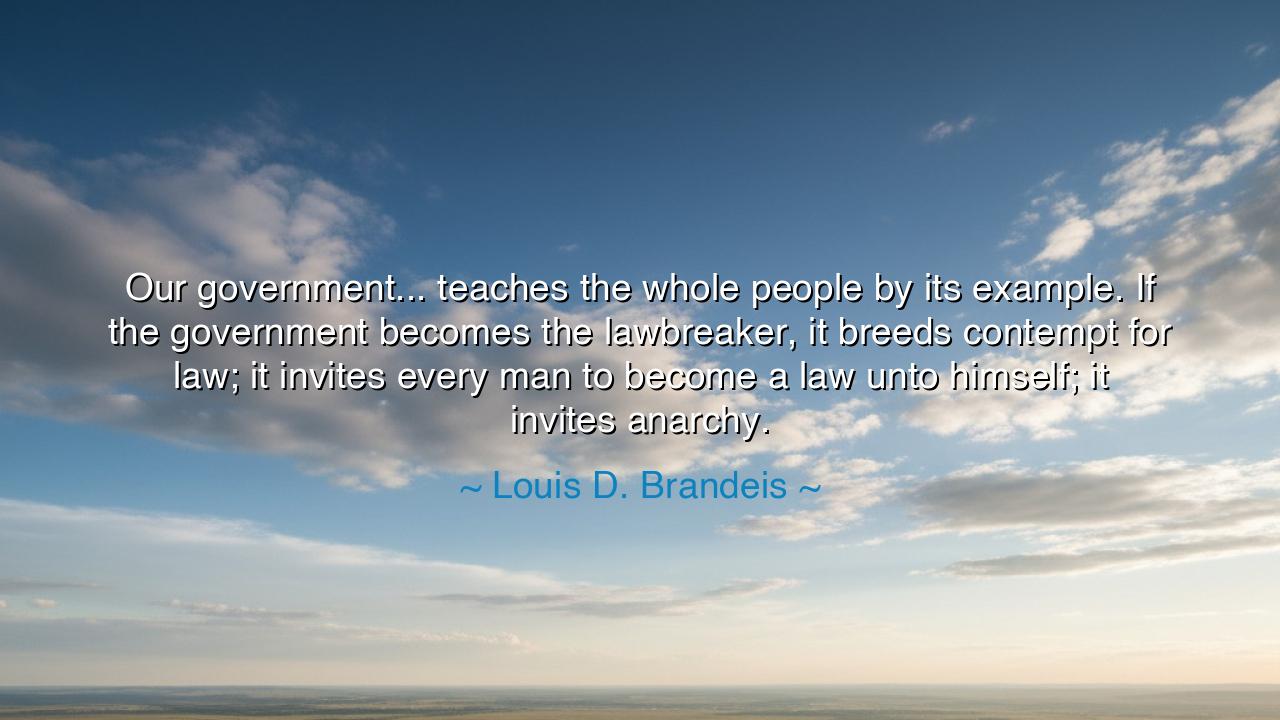
Our government... teaches the whole people by its example. If the
Our government... teaches the whole people by its example. If the government becomes the lawbreaker, it breeds contempt for law; it invites every man to become a law unto himself; it invites anarchy.






The great jurist Louis D. Brandeis, a guardian of liberty and conscience, once declared: “Our government… teaches the whole people by its example. If the government becomes the lawbreaker, it breeds contempt for law; it invites every man to become a law unto himself; it invites anarchy.” These words, spoken in the early 20th century, ring with the solemn gravity of prophecy. They remind us that the moral strength of a nation rests not merely upon its laws, but upon the integrity of those who enforce them. Brandeis saw that when power abandons justice, when the state itself betrays the law, it unravels the very fabric of civilization.
This quote was born from Brandeis’s dissent in Olmstead v. United States (1928), a case concerning the government’s use of wiretapping without a warrant. The state had broken its own rules in pursuit of criminals, arguing that the ends justified the means. But Brandeis, steadfast and visionary, rejected this reasoning. He warned that a government which commits injustice in the name of justice corrupts both law and soul. If the people see their rulers cheat, lie, or steal under the pretext of security or expedience, they too will lose faith in obedience. Thus, tyranny and lawlessness spring not from the masses, but from the example of the mighty.
To Brandeis, law was not a weapon of power, but a covenant of trust. He understood that the true authority of government does not come from force, but from the belief that it is righteous and fair. Once that belief dies, no constitution or army can preserve order. History bears grim witness to this truth. When the Watergate scandal erupted in the United States, it was not merely a political crime—it was a moral collapse. The president himself had conspired to subvert justice, and in doing so, he confirmed Brandeis’s warning: the lawbreaker in high office teaches others that corruption is permissible. The wound was not only legal—it was spiritual, striking at the heart of public faith.
Across ages and empires, the same pattern repeats. In ancient Rome, when emperors placed themselves above the law, they paved the road to decay. The people, once proud citizens, became cynical subjects. They obeyed out of fear, not respect. In modern times, regimes that twist the law to crush dissent sow the seeds of their own ruin. When citizens no longer believe in the justice of their rulers, they cease to see any virtue in restraint. Then chaos rises, and the dream of order dies.
Brandeis’s insight reaches far beyond the courtroom. His words speak to all forms of leadership—political, social, and personal. Every teacher, parent, or leader governs by example. If they preach virtue but practice deceit, those who follow will learn hypocrisy, not honor. A community, like a nation, thrives not on commands, but on trust. It is the example of integrity that inspires loyalty; the example of corruption that breeds rebellion. Thus, to govern rightly, one must first govern oneself.
The emotional core of Brandeis’s wisdom lies in his reverence for accountability. No man, no office, no cause is above the law. The moment the law bends to serve power, it ceases to be law—it becomes domination. Justice, he reminds us, must be blind not only to wealth and poverty, but also to authority itself. When those entrusted with power break the very rules they enforce, they summon the storm of anarchy that they claim to fear. The greatest danger to a nation is not the defiance of the weak, but the corruption of the strong.
So let this teaching be carried forward as a torch for every generation: the ruler’s conduct is the people’s compass. When power honors justice, the nation stands upright; when power mocks it, the nation stumbles. The lesson is both noble and personal—hold yourself to the same standard you demand of others. Whether in government, business, or private life, be the example that uplifts, not the exception that excuses wrongdoing.
In the end, Brandeis’s warning is not merely about law—it is about the soul of democracy itself. A government that lives by truth teaches its people to cherish liberty. A government that lies teaches them to despise it. Therefore, guard the sanctity of law as you would guard the sanctity of conscience. For when justice falls silent, freedom follows it into the grave.






AAdministratorAdministrator
Welcome, honored guests. Please leave a comment, we will respond soon